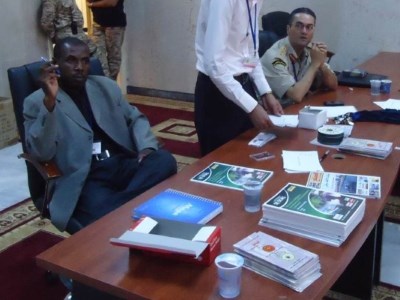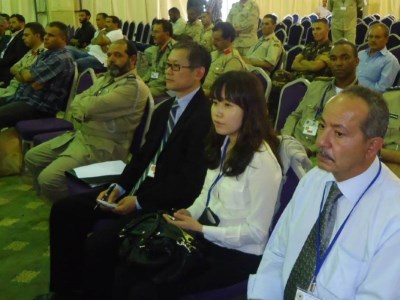Sheikh Omar Mukhtar led the "Supreme Council" of jihad operations, which conducted the greatest battles in Libyan history against the Italian occupiers, especially after the Turks withdrew from the country in 1912 following the
Treaty of Lausanne, in which they relinquished Libya to Italy.
His life was distinguished by receiving Islamic knowledge in the Jaghboub Oasis, and leading the resistance against the Italian occupation using guerrilla warfare tactics. This earned him a worldwide reputation as a national symbol and a Mujahid Sheikh.
Mukhtar was born in the village of Zawiyat Janzur in eastern Libya in 1862. He received his religious education in the Jaghboub Oasis, the stronghold of the Senussi movement.
He studied jurisprudence, hadith, Quranic interpretation, and the Arabic language under the guidance of the senior scholars of the Senussi movement. He earned the title "Sidi" and was nicknamed "The Lion of the Desert" for his intelligence and courage. He led the Zawiya of Al-Qusur in the Green Mountain region and played a vital role in spreading Islamic principles and teachings among the tribes.
After the Italian occupation of Libya in 1911, Omar Mukhtar led the resistance against the Italian forces in eastern Libya. He became famous for his military skills in hit-and-run tactics, managing training camps for fighters and forming battalions under his flexible and wise leadership.
In mid-1929, Mukhtar attempted to negotiate with the Italians, forcing the governors of Tripoli and Cyrenaica to meet him, but he soon realized that their intention was to buy time to trap him.
The fascist Italian General Graziani, nicknamed "The Neighbor of Fezzan," wrote in his book "Quiet Cyrenaica" that he met with Omar Mukhtar in 263 battles during his rule in Cyrenaica, which did not exceed twenty months!
Although Mukhtar never received formal military training in large military academies, he was an expert in combat and maneuvers. He learned military strategies and war skills on the battlefield alongside his men against the Italians, surpassing them and instilling fear whenever his name was mentioned. Despite this, he did not have a formal army like his enemy; his forces were lightly equipped but deeply faithful and resolute in their beliefs.
Important dates in the life of Omar Mukhtar:
Omar Mukhtar was born on August 20, 1858 (10 Muharram 1275 AH) in Cyrenaica, Libya.
He began his resistance against the Italian occupation after the Italian invasion of Libya in 1911, at the age of 53.
He fought battles and resisted the Italian invasion for nearly 20 years, including the famous Battle of Derna in 1913 and others in the following years.
In 1931, he was captured by Italian forces and executed by hanging on September 16, 1931 (3 Jumada al-Awwal 1350 AH) in the town of Suluq after a sham trial.
Despite all the political, tribal, and military divisions and conflicts that Libya experienced since the early last century, and the disputes they caused over many figures who led these stages, the name of Sheikh Omar Mukhtar remains the only name that the Libyan people as a whole agree to respect, revere, and love. His pure legacy remains a source of national sentiment and pride for Libyans throughout history.












 English
English  العربية
العربية 








